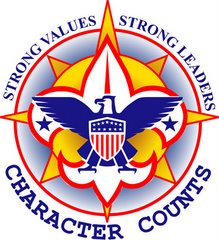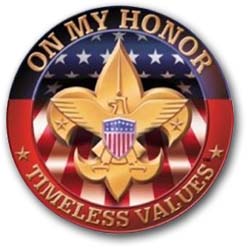Thursday, March 30, 2006
PLC for Troop 150
Thursday 3/30 @ 6pm prior to the Troop Meeting. All PL and PLA to meet w/ the Troop Leadership in the John Fuller library
Next course for DWC Wood Badge
NE - I - 250
Location
Griswold Hidden Valley Scout Reservation
Gilmanton Iron Works, New Hampshire
Course Dates
Friday, Saturday & Sunday
September 15-17 and
Friday, Saturday & Sunday
September 29, 30 & October 1st
Arrive Friday 8 A.M. ~ Depart Sunday 5:00 P.M.
Cost
$ 180 – Includes food, camping and Administrative costs.
Course Director
Curtis Duclos
Tel #: 603-497-3236
Email: Duclos7979@comcast.net
For more information call:
Daniel Webster Council
1-800-221-0009
Location
Griswold Hidden Valley Scout Reservation
Gilmanton Iron Works, New Hampshire
Course Dates
Friday, Saturday & Sunday
September 15-17 and
Friday, Saturday & Sunday
September 29, 30 & October 1st
Arrive Friday 8 A.M. ~ Depart Sunday 5:00 P.M.
Cost
$ 180 – Includes food, camping and Administrative costs.
Course Director
Curtis Duclos
Tel #: 603-497-3236
Email: Duclos7979@comcast.net
For more information call:
Daniel Webster Council
1-800-221-0009
Tell them Andy Chalmers sent you NE-1-243, Beaver Patrol
What is Wood Badge
What is Wood Badge?
Wood Badge is a training course for Scouters which finally results in their receiving a certificate, a small neckerchief, a leather slide, and two small wooden beads on a leather thong. Lord Baden-Powell, the founder of Scouting, directed the first course in 1919 and gave each of the participants one of the beads which he had captured from the African chieftain Dinizulu. Thus did the course name develop, for its symbol was literally a badge of wood.
Wood Badge is, further, Scouting's premier training course. Baden-Powell designed it so that Scouters could learn, in as practical a way possible, the skills and methods of Scouting. It is first and foremost, learning by doing. The members of the course are formed into patrols and these into a troop.
The uniqueness of Scouting is the patrol method. The use of the natural gang of six or eight boys who elect their own leader and plan and carry out many of their own activities is a democracy in microcosm. Here young men learn the give and take of working with people as they must surely do all their lives. Here, too, they are given leadership and learning opportunities which prepare them for their future roles as citizens. It is for this reason that it is so crucial that all adults understand thoroughly the patrol method.
Thus it was that Baden-Powell developed a practical course built around the operation of a troop and it's patrols.
Wood Badge is more than just mechanical course work. Wood Badge is the embodiment of Scouting spirit. Like many intense training experiences, it has always relied on a busy schedule forcing the participants to work together, to organize and to develop an enthusiasm and team spirit to accomplish the tasks and challenges placed before them. Carried out in context of Scouting ideals and service to young people, the course brings out a deep dedication and spirit of brotherhood and fellowship in most participants. Certainly were it not for the common goal of the movement and its program for young people, it would be hard to get grown men and women to endure the 16-hour days required by a program that runs from early morning to late at night.
The course is designed to be a highlight --"a mountaintop experience" -- for the course participants. Careful planning and strict attention to detail provides a physical/logistic support and program second to none. Add to this a thoroughly prepared and enthusiastic staff and it is little wonder that most Scouters return from Wood Badge inspired and prepared to do an even better job of providing Scouting to boys. In addition to a fine course, all the traditions and heritage of Scouting are stressed and used to inspire those attending. Wood Badge in one form or another is used throughout the Scouting world. Tens of thousands of Scouters proudly wear the Gilwell neckerchief, woggle, and beads of Wood Badge-trained leaders. Because it was begun by Baden-Powell in England in 1919, it is clearly backed by the finest thought and tradition of the founder and thus carries with it great prestige. Wood Badge is then, a great force for world brotherhood, for though it uses the local traditions in each country, it emphasizes the international aspects of the movement and the heritage of Baden-Powell and Gilwell Park.
Portions excerpted from the History of Wood Badge BSA Publication # 3164, which may be purchased from your Scout Shop or from the National Supply Division.
Wood Badge is a training course for Scouters which finally results in their receiving a certificate, a small neckerchief, a leather slide, and two small wooden beads on a leather thong. Lord Baden-Powell, the founder of Scouting, directed the first course in 1919 and gave each of the participants one of the beads which he had captured from the African chieftain Dinizulu. Thus did the course name develop, for its symbol was literally a badge of wood.
Wood Badge is, further, Scouting's premier training course. Baden-Powell designed it so that Scouters could learn, in as practical a way possible, the skills and methods of Scouting. It is first and foremost, learning by doing. The members of the course are formed into patrols and these into a troop.
The uniqueness of Scouting is the patrol method. The use of the natural gang of six or eight boys who elect their own leader and plan and carry out many of their own activities is a democracy in microcosm. Here young men learn the give and take of working with people as they must surely do all their lives. Here, too, they are given leadership and learning opportunities which prepare them for their future roles as citizens. It is for this reason that it is so crucial that all adults understand thoroughly the patrol method.
Thus it was that Baden-Powell developed a practical course built around the operation of a troop and it's patrols.
Wood Badge is more than just mechanical course work. Wood Badge is the embodiment of Scouting spirit. Like many intense training experiences, it has always relied on a busy schedule forcing the participants to work together, to organize and to develop an enthusiasm and team spirit to accomplish the tasks and challenges placed before them. Carried out in context of Scouting ideals and service to young people, the course brings out a deep dedication and spirit of brotherhood and fellowship in most participants. Certainly were it not for the common goal of the movement and its program for young people, it would be hard to get grown men and women to endure the 16-hour days required by a program that runs from early morning to late at night.
The course is designed to be a highlight --"a mountaintop experience" -- for the course participants. Careful planning and strict attention to detail provides a physical/logistic support and program second to none. Add to this a thoroughly prepared and enthusiastic staff and it is little wonder that most Scouters return from Wood Badge inspired and prepared to do an even better job of providing Scouting to boys. In addition to a fine course, all the traditions and heritage of Scouting are stressed and used to inspire those attending. Wood Badge in one form or another is used throughout the Scouting world. Tens of thousands of Scouters proudly wear the Gilwell neckerchief, woggle, and beads of Wood Badge-trained leaders. Because it was begun by Baden-Powell in England in 1919, it is clearly backed by the finest thought and tradition of the founder and thus carries with it great prestige. Wood Badge is then, a great force for world brotherhood, for though it uses the local traditions in each country, it emphasizes the international aspects of the movement and the heritage of Baden-Powell and Gilwell Park.
Portions excerpted from the History of Wood Badge BSA Publication # 3164, which may be purchased from your Scout Shop or from the National Supply Division.
Wednesday, March 22, 2006
Mark your calendars
Troop 150 CAMP IN
When; Friday, April 14 @ 6pm to Saturday, April 15… done before noon
Where; NCCC
See Andy Chalmers for more details
When; Friday, April 14 @ 6pm to Saturday, April 15… done before noon
Where; NCCC
See Andy Chalmers for more details
Pack Meeting
Don’t forget there is a Pack meeting Thursday night @ Pine Tree School, 6:30 pm
There will be an FOS presentation, PLEASE give generously. It costs the Council over $200 per Scout to provide the program and services that our son’s enjoy. If we are not paying these costs someone else is.
Thanks for all you do for Scouting
-Andy
There will be an FOS presentation, PLEASE give generously. It costs the Council over $200 per Scout to provide the program and services that our son’s enjoy. If we are not paying these costs someone else is.
Thanks for all you do for Scouting
-Andy
Subscribe to:
Comments (Atom)


